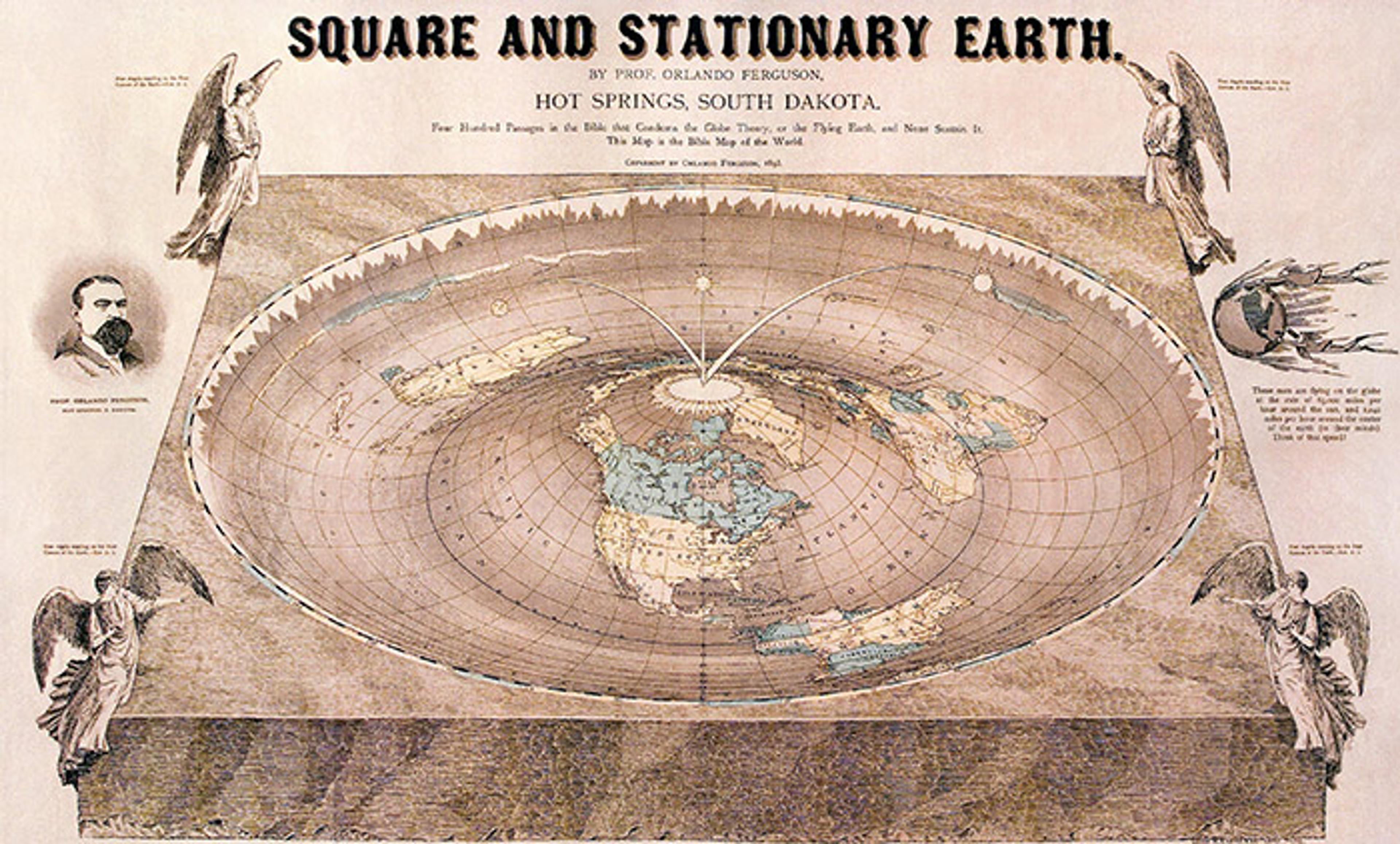
A Map of the Square and Stationary Earth by Professor Orlando Ferguson, South Dakota, 1893. Photo courtesy Wikipedia
Today, there is a crisis of trust in science. Many people – including politicians and, yes, even presidents – publicly express doubts about the validity of scientific findings. Meanwhile, scientific institutions and journals express their concerns about the public’s increasing distrust in science. How is it possible that science, the products of which permeate our everyday lives, making them in many ways more comfortable, elicits such negative attitudes among a substantial part of the population? Understanding why people distrust science will go a long way towards understanding what needs to be done for people to take science seriously.
Political ideology is seen by many researchers as the main culprit of science skepticism. The sociologist Gordon Gauchat has shown that political conservatives in the United States have become more distrusting of science, a trend that started in the 1970s. And a swath of recent research conducted by social and political psychologists has consistently shown that climate-change skepticism in particular is typically found among those on the conservative side of the political spectrum. However, there is more to science skepticism than just political ideology.
The same research that has observed the effects of political ideology on attitudes towards climate change has also found that political ideology is not that predictive of skepticism about other controversial research topics. Work by the cognitive scientist Stephan Lewandowsky, as well as research led by the psychologist Sydney Scott, observed no relation between political ideology and attitudes toward genetic modification. Lewandowsky also found no clear relation between political conservatism and vaccine skepticism.
So there is more that underlies science skepticism than just political conservatism. But what? It is important to systematically map which factors do and do not contribute to science skepticism and science (dis)trust in order to provide more precise explanations for why a growing number of individuals reject the notion of anthropogenic climate change, or fear that eating genetically modified products is dangerous, or believe that vaccines cause autism.
My colleagues and I recently published a set of studies that investigated science trust and science skepticism. One of the take-home messages of our research is that it is crucial not to lump various forms of science skepticism together. And although we were certainly not the first to look beyond political ideology, we did note two important lacunae in the literature. First, religiosity has so far been curiously under-researched as a precursor to science skepticism, perhaps because political ideology commanded so much attention. Second, current research lacks a systematic investigation into various forms of skepticism, alongside more general measures of trust in science. We attempted to correct both oversights.
People can be skeptical or distrusting of science for different reasons, whether it is about one specific finding from one discipline (for example, ‘The climate is not warming, but I believe in evolution’), or about science in general (‘Science is just one of many opinions’). We identified four major predictors of science acceptance and science skepticism: political ideology; religiosity; morality; and knowledge about science. These variables tend to intercorrelate – in some cases quite strongly – which means that they are potentially confounded. To illustrate, an observed relation between political conservatism and trust in science might in reality be caused by another variable, for example religiosity. When not measuring all constructs simultaneously, it is hard to properly assess what the predictive value of each of these is.
So, we investigated the heterogeneity of science skepticism among samples of North American participants (a large-scale cross-national study of science skepticism in Europe and beyond will follow). We provided participants with statements about climate change (eg, ‘Human CO2 emissions cause climate change’), genetic modification (eg, ‘GM of foods is a safe and reliable technology’), and vaccination (eg, ‘I believe that vaccines have negative side effects that outweigh the benefits of vaccination for children’). Participants could indicate to what extent they agreed or disagreed with these statements. We also measured participants’ general faith in science, and included a task in which they could indicate how much federal money should be spent on science, compared with various other domains. We assessed the impact of political ideology, religiosity, moral concerns and science knowledge (measured with a science literacy test, consisting of true or false items such as ‘All radioactivity is made by humans’, and ‘The centre of the Earth is very hot’) on participants’ responses to these various measures.
Political ideology did not play a meaningful role when it came to most of our measures. The only form of science skepticism that was consistently more pronounced among the politically conservative respondents in our studies was, not surprisingly, climate-change skepticism. But what about the other forms of skepticism, or skepticism of science generally?
Skepticism about genetic modification was not related to political ideology or religious beliefs, though it did correlate with science knowledge: the worse people did on the scientific literacy test, the more skeptical they were about the safety of genetically modified food. Vaccine skepticism also had no relation to political ideology, but it was strongest among religious participants, with a particular relation to moral concerns about the naturalness of vaccination.
Moving beyond domain-specific skepticism, what did we observe about a general trust in science, and the willingness to support science more broadly? The results were quite clear: trust in science was by far the lowest among the religious. In particular, religious orthodoxy was a strong negative predictor of faith in science and the orthodox participants were also the least positive about investing federal money in science. But notice here again political ideology did not contribute any meaningful variance over and beyond religiosity.
From these studies there are a couple of lessons to be learned about the current crisis of faith that plagues science. Science skepticism is quite diverse. Further, distrust of science is not really that much about political ideology, with the exception of climate-change skepticism, which is consistently found to be politically driven. Additionally, these results suggest that science skepticism cannot simply be remedied by increasing people’s knowledge about science. The impact of scientific literacy on science skepticism, trust in science, and willingness to support science was minor, save for the case of genetic modification. Some people are reluctant to accept particular scientific findings, for various reasons. When the aim is to combat skepticism and increase trust in science, a good starting point is to acknowledge that science skepticism comes in many forms.





